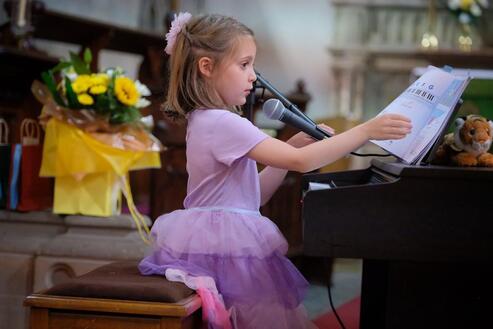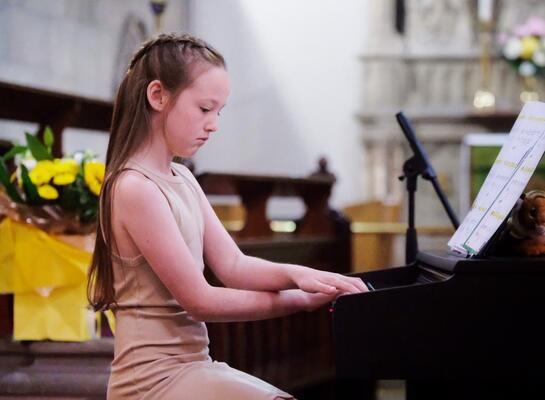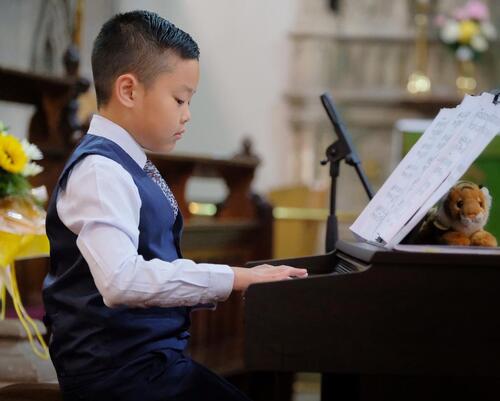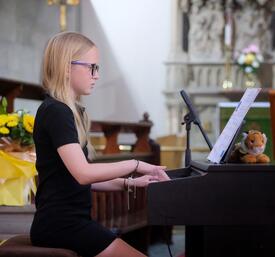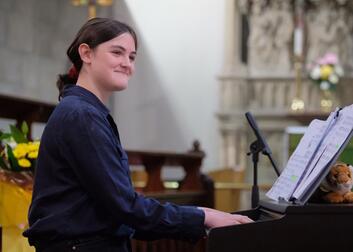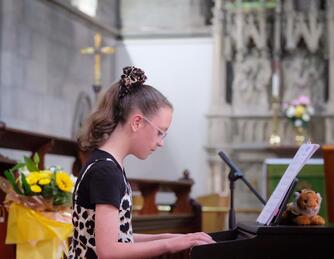These are some of the most frequently asked questions by prospective piano students and their parents.
If you have any other questions for me, please feel free to get in touch.
COVID-19
We are putting in place a comprehensive set of measures to keep everyone COVID-19 secure.
We have completed Risk Assessment to ensure its compliance with the government’s guidelines.
Safety measures to minimise the risk, i.e. hand washing, piano keys cleaning between lessons,
social distancing and face masks are in place.
Where do the Lessons Take Place?
At Brook Piano Studio, in Maghull, 29. Brook Road, L31 3EG.
Do parents need to attend the classes?
Your child's first lesson is the most important lesson of all.
In this session I will outline the key foundations for ensuring their musical success and will explain your essential role in this process.
It is therefore very important that parents attend the first lesson with their child, observing safety measures outlined above (Covid-19 update).
Following this lesson, I encourage all children to attend their lessons without a parent which helps develop your child's independence and confidence.
As your child's teacher, I will keep you updated regularly with their progress and wherever your assistance is required I will discuss how you can help.
Is the teacher qualified, CRB/DBS checked and holds a Professional Membership?
I am Qualified Music Teacher, recently completed my PGCE ( Postgraduate Certificate in Education) and hold QTS (Qualified Teacher Status).
My up-to-date Enhanced DBS certificate is available for you to see, should you wish to peruse it.
I am a full member of EPTA (European Piano Teachers Association) and have a PUBLIC LIABILITY INSURANCE.
Do I Need A Piano At Home?
You will need an instrument to practise on.
Acoustic pianos are generally best, but a full size (88 weighted keys) digital keyboard is adequate.
How Much Practice Is Necessary?
This depends on the level and age of the student, and how fast they want to progress.
Ideally, practice happens every day with weekly assignments completed as required.
What Books Do I Need?
I use different books and methods to suit different learning styles.
My most commonly used method is Piano Adventures.
I am constantly researching new materials and expanding my library, so I can find the music that inspires each and every student.
What’s The Youngest Age Student You Will Teach?
I successfully teach students as young as four years old.
Do Your Students Get Opportunities To Perform?
They do! Getting to share music with others is one of the best parts of learning to play an instrument.
We try to organise regular opportunities for students to perform in.
Shy students are welcome to just come and watch other performances.
Do Your Students Do Music Theory and Piano Graded Exams?
Students are welcome to take exams, but it’s not a requirement.
I use the ABRSM Exams Board, but if you wish to use a different exams board, that can be accommodated.
What Type Of Music Can I Learn?
I teach a variety of music genres, with something for everyone, I hope.
Although some classical music is generally necessary for good progress to be made, you are by no means limited to classical music.
My students learn popular, jazz, blues, soul, rock. If the student loves the music, that’s all that matters to me.
If you have any other questions for me, please feel free to get in touch.
COVID-19
We are putting in place a comprehensive set of measures to keep everyone COVID-19 secure.
We have completed Risk Assessment to ensure its compliance with the government’s guidelines.
Safety measures to minimise the risk, i.e. hand washing, piano keys cleaning between lessons,
social distancing and face masks are in place.
Where do the Lessons Take Place?
At Brook Piano Studio, in Maghull, 29. Brook Road, L31 3EG.
Do parents need to attend the classes?
Your child's first lesson is the most important lesson of all.
In this session I will outline the key foundations for ensuring their musical success and will explain your essential role in this process.
It is therefore very important that parents attend the first lesson with their child, observing safety measures outlined above (Covid-19 update).
Following this lesson, I encourage all children to attend their lessons without a parent which helps develop your child's independence and confidence.
As your child's teacher, I will keep you updated regularly with their progress and wherever your assistance is required I will discuss how you can help.
Is the teacher qualified, CRB/DBS checked and holds a Professional Membership?
I am Qualified Music Teacher, recently completed my PGCE ( Postgraduate Certificate in Education) and hold QTS (Qualified Teacher Status).
My up-to-date Enhanced DBS certificate is available for you to see, should you wish to peruse it.
I am a full member of EPTA (European Piano Teachers Association) and have a PUBLIC LIABILITY INSURANCE.
Do I Need A Piano At Home?
You will need an instrument to practise on.
Acoustic pianos are generally best, but a full size (88 weighted keys) digital keyboard is adequate.
How Much Practice Is Necessary?
This depends on the level and age of the student, and how fast they want to progress.
Ideally, practice happens every day with weekly assignments completed as required.
What Books Do I Need?
I use different books and methods to suit different learning styles.
My most commonly used method is Piano Adventures.
I am constantly researching new materials and expanding my library, so I can find the music that inspires each and every student.
What’s The Youngest Age Student You Will Teach?
I successfully teach students as young as four years old.
Do Your Students Get Opportunities To Perform?
They do! Getting to share music with others is one of the best parts of learning to play an instrument.
We try to organise regular opportunities for students to perform in.
Shy students are welcome to just come and watch other performances.
Do Your Students Do Music Theory and Piano Graded Exams?
Students are welcome to take exams, but it’s not a requirement.
I use the ABRSM Exams Board, but if you wish to use a different exams board, that can be accommodated.
What Type Of Music Can I Learn?
I teach a variety of music genres, with something for everyone, I hope.
Although some classical music is generally necessary for good progress to be made, you are by no means limited to classical music.
My students learn popular, jazz, blues, soul, rock. If the student loves the music, that’s all that matters to me.
